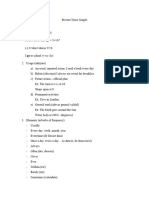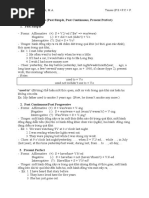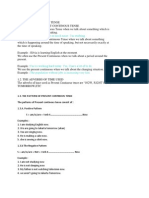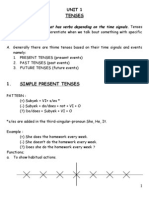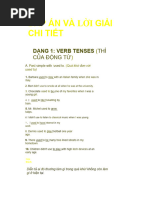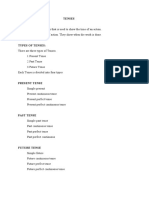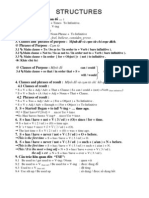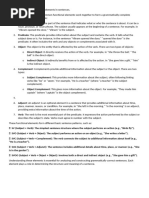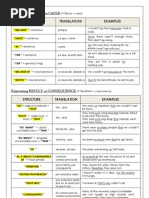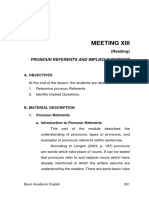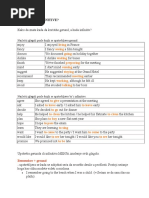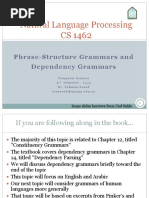0 ratings0% found this document useful (0 votes)
43 viewsA R R A N G E D By: Group Name: Black Widow Members
A R R A N G E D By: Group Name: Black Widow Members
Uploaded by
RiPu1. The document summarizes the 16 tenses in English, organized into simple definitions and examples for each tense.
2. The tenses covered include: simple present, present continuous, present perfect, present perfect continuous, simple past, past continuous, past perfect, past perfect continuous, simple future, and others.
3. For each tense, formulas are provided for both verbal and nominal sentences, along with examples and common time adverbs used with each tense.
Copyright:
© All Rights Reserved
Available Formats
Download as DOCX, PDF, TXT or read online from Scribd
A R R A N G E D By: Group Name: Black Widow Members
A R R A N G E D By: Group Name: Black Widow Members
Uploaded by
RiPu0 ratings0% found this document useful (0 votes)
43 views14 pages1. The document summarizes the 16 tenses in English, organized into simple definitions and examples for each tense.
2. The tenses covered include: simple present, present continuous, present perfect, present perfect continuous, simple past, past continuous, past perfect, past perfect continuous, simple future, and others.
3. For each tense, formulas are provided for both verbal and nominal sentences, along with examples and common time adverbs used with each tense.
Original Description:
pelajaran ms word dan 16 tenses
Original Title
ms.word dan 16 tenses
Copyright
© © All Rights Reserved
Available Formats
DOCX, PDF, TXT or read online from Scribd
Share this document
Did you find this document useful?
Is this content inappropriate?
1. The document summarizes the 16 tenses in English, organized into simple definitions and examples for each tense.
2. The tenses covered include: simple present, present continuous, present perfect, present perfect continuous, simple past, past continuous, past perfect, past perfect continuous, simple future, and others.
3. For each tense, formulas are provided for both verbal and nominal sentences, along with examples and common time adverbs used with each tense.
Copyright:
© All Rights Reserved
Available Formats
Download as DOCX, PDF, TXT or read online from Scribd
Download as docx, pdf, or txt
0 ratings0% found this document useful (0 votes)
43 views14 pagesA R R A N G E D By: Group Name: Black Widow Members
A R R A N G E D By: Group Name: Black Widow Members
Uploaded by
RiPu1. The document summarizes the 16 tenses in English, organized into simple definitions and examples for each tense.
2. The tenses covered include: simple present, present continuous, present perfect, present perfect continuous, simple past, past continuous, past perfect, past perfect continuous, simple future, and others.
3. For each tense, formulas are provided for both verbal and nominal sentences, along with examples and common time adverbs used with each tense.
Copyright:
© All Rights Reserved
Available Formats
Download as DOCX, PDF, TXT or read online from Scribd
Download as docx, pdf, or txt
You are on page 1of 14
16 Tenses Of English
A
R
R
A
N
G
E
D
By:
Group Name : Black Widow
Members:
-Eliene Simatupang
-Joan Angel Sirait
-Amsal Y Pangaribuan
-Saputra Gultom
-Irvan Silaen
Class: Eleven Natural Science Three
TRISAKTI CHATOLIC SENIOR HIGH
SCHOOL
2017-2018
1.Simple Present Tense (Waktu sekarang sederhana)
• The Formula of Verbal
(+) S + V1 s/es + O
(-) S + do/does not + V1 + O…
(?) Do/Does + S + V…?
• The Formula of Nominal
(+) S + be(am, is, are) Complement
(-) S + be + not + Complement
(?) Be + S + Complement ?
Function:
1. To express the habit.
2. To state the general truth.
3. To declare something that has been scheduled.
4. For the writing of headlines in newspapers / newspapers
5. To declare a sequential event or a completed event and followed
by another event at the time of speaking.
6. To declare one's ability.
7. For the command line.
Adverbs:
The example sentences:
*Everyday =Setiap hari
* I go to school everyday. (Saya
*Every Morning=Setiap pagi
pergi ke sekolah setiap hari)
*Every night=Setiap malam
* Ice melts at 100 Celcius. ( Es
*Every Sunday=SetiaphariMinggu
meleleh pada suhu 100 Celcius)
*Every week=Setiap pekan
*Our class begins at 7 (Kelas kita
*Everymonth=Setiap bulan
mulai jam 7)
*Every year=Setiap tahun
* She speaks English fluently
*On Mondays=Pada hari Senin
(Dia berbicara bahasa Inggris
*Sometimes = Kadang-kadang
dengan lancar)
*Always=Selalu
* Be careful ! (Berhati-hatilah ! )
*Often=Sering
* I am happy. (Saya bahagia)
*Seldom=Jarang
kalimat nominal.
*Usually=Biasanya
* She is a rich woman (Dia
*Rarely=Jarang sekali
wanita kaya) kalimat nominal.
2.Present Continuous Tense (Waktu berlangsung sekarang
The Formula of Verbal
(+) S + be + V-ing + O
(-) S + be + not + V-ing + O
(?) Be + S + V-ing + O…
The formula of Nominal
(+) S + be (am, is, are) + Adj / Noun / Adverb
(-) S + be + not + Adj / Noun / Adverb
(?) Be + S + Adj / Noun / Adverb
Function:
1. To state an ongoing event at the time of speech.
2. To declare an ongoing event within the processframework.
3. To express annoyance.
4. To declare the time to come when it is already planned.
5. To declare events gradually changed
Adverbs :
*Now = Sekarang
*Rightnow = Saat ini
*At present = Saat ini
*At the moment = Saat ini
*At the time = Saat ini
*Today = Hari ini
*This week = Minggu ini ↱
*This month = Bulan ini sedang berlangsung
*This year = Tahun ini dalam kerangka proses.
*This summer = Musim panas ini ↳
*Look ! = Lihatlah !
*Listen ! = Dengar!
The example sentences:
* Look ! She is smilling at you (Lihat ! dia sedang tersenyum padamu)
* My father is working now ( Ayahku sedang bekerja sekarang)
* Henry : What is your activity now ? (Apa kegiatanmu sekarang ?)
Diana : I am studying English in Mahesa this year.
( Saya sedang belajar bahasa Inggris di Mahesa tahun ini)
*The baby is crying because he is thirsty.
(Bayi itu sedang menangis karena dia haus)
*They are playing football in the field . (Mereka sedang bermain
sepak bola di lapangan )
3. Present Perfect Tense (Waktu sempurna sekarang)
• The Formula of Verbal
(+) S + Have/Has + V3 + O
(-) S + Have/Has + not + V3 + O
(?) have/has + S + V3 + O
• The formula of Nominal:
(+) S + have/has + to be 3 (been) + non verb + O
(-) S + have/has + not + to be 3 + non verb + O
(?) have/has + S + to be 3 + non verb + O?
Function:
1. Used to describe a perfectly completed activity.
2. Explain about events that are still ongoing.
Adverbs :
*Lately : akhir-akhir ini
*Recently : baru-baru ini
*Never : tidak pernah
*Ever : pernah
*Just : baru saja
The example sentences:
*Dino has eaten two plates of rice ( Dino sudah makan dua piring
nasi ) verbal
*But he hasn't been full ( Tapi dia belum kenyang) nominal
*Has Dino eaten ? ( Sudahkah dino makan ? ) verbal
*Has Dino been full ? ( Sudahkah Dino kenyang ? ) nominal
4. Present Perfect Continuous (Waktu Berlangsung
Sempurna Sekarang)
• The Formula of Verbal
(+) S + have/has + been + V-ing + O + Adj / Noun / Adverb
(-) S + have/ has + not + been + V-ing + O + Adj / Noun / Adverb
(?) Have/has + S + been + V-ing + O + Adj / Noun / Adverb
• The formula of Nominal:
(+) S + has/have + been + Adj / Noun / Adverb
(-) S + has/have + not + been + Adj / Noun / Adverb
(?) Has/have + S + been + Adj / Noun / Adverb
Function:
1. State the activity that began in the past and still lasts until
now.
2. To declare events that have just been done but the effects
can still be felt today.
Adverbs:
*For : selama
*Since : sejak
*All day : sepanjang hari
*All week : sepanjang minggu
The example sentences:
*I have been waiting for you for an hour (Aku sudah menunggumu
selama satu jam)
*She hasn’t been studying for one week (Dia sudah tidak belajar
selama satu minggu)
*Look ! Dona's eyes are red because she has been crying. ( Lihat
mata Dona merah sebab dia baru saja menangis )
5. Simple Past Tense (Waktu lampau sederhana)
The formula of Verbal:
(+) S + V2 + O + Adj / Noun / Adverb
(-) S + did + not + V1 + O + Adj / Noun / Adverb
(?) Did + S + V1 + O + Adj / Noun / Adverb ?
The formula of Nominal:
(+) S + (was/were) + Adj / Noun / Adverb
(-) S + (was/were) + Adj / Noun / Adverb
(?) (was/were) + S + Adj / Noun / Adverb?
Function:
1. To express habits in the past.
2. To declare general truths in the past.
3. To state an event that happened in the past
Averbs :
*Yesterday= kemarin
*Yesterday morning=Kemarin pagi
*Last day= Sehari yang lalu
*Last night= Tadi malam
*Last week= Pekan lalu
*Last month=Bulan lalu
*Last year= Tahun lalu
*On Sunday morning=Pada hari minggu
*On hour ago= Sejam yang lalu
*One day ago= Satu hari yang lalu
*Two days ago= Dua hari yang lalu
*Three weeks ago = Tiga hari yang lalu
*Four year ago= Empat tahun yang lalu
*The day before yesterday= Kemarin lusa
*2 days before yesterday= 2 hari sebelum kemarin
*In 1990 = Pada tahun 1990
The example sentences:
*Budi played football yesterday. (Budi bermain sepak bola kemarin)
*I met Novi last night. ( Saya bertemu Novi tadi malam).
*She Sould her car two days ago. ( Dia menjual mobilnya dua hari
yang lalu)
*Columbus discovered America Continent. ( Columbus menemukan
benua Amerika)
*Netherlands colonized Indonesia. (Belanda dulu menjajah
Indonesia)
6. Past Continuous Tense (Waktu berlangsung lampau)
The formula of Verbal:
(+) S + to be 2 (was/were) + V-ing + O
(-) S + to be 2 (was/were) + not + V-ing + O
(?) to be 2 (was/were) + S + V-ing + O
The formula of Nominal:
(+) S + to be 2 + Adj / Noun / Adverb
(-) S + to be 2 + not + ANA
(?) to be 2 + S + ANA ?
Function:
1. To state an event that is going on in the past.
2. To declare events gradually changed in the past.
Adeverb :
*At 7 o’clock yesterday= Pada jam 7 tadi
*At this time yesterday = Saat ini kemarin
*At the same time yesyerday = Pada waktu yang sama kemarin
The example sentences:
1. I went to Farhan's house last night. When I came, he was
watching TV. ( Saya pergi ke rumahnaya Farhan tadimalam. Ketika
saya datang, dia sedang menonton TV)
2. The wind was blowing harder last night.(Anginnya bertiup
semakin kencang semalam)
7. Past Perfect Tense (Waktu Sempurna Lampau)
The formula of Verbal:
(+) S + had + V3
(-) S + had + not + V3
(?) Had + S + V3
The formula of Nominal:
(+) S + had + been + Adj / Noun / Adverb
(-) S + had + not + been + Adj / Noun / Adverb
(?) Had + S + been + Adj / Noun / Adverb ?
Function:
Used to express an activity that has occurred when other
activities happened last time
Adverbs :
*Before
*When
*After
The example sentences:
*I had bought a book before you came (Saya sudah membeli sebuah
buku sebelum kamu datang)
*When I was child , my mother had helped me (Ketika aku masih
kecil, ibuku membantuku)
*She visited me after you had called me ( Dia mengunjungiku setelah
kamu menelponku)
8. Past Perfect Continuous Tense (Waktu berlangsung
sempurna lampau)
The formula of Verbal
(+) S + had + been + V-ing
(-) S + had + not + been + V-ing
(?) Had + S + been + V-ing
The formula of Nominal
(+) S + Had + Been + Being + O+ Adj / Noun / Adverb
(-) S + Had + Not + Been + Being + O + Adj / Noun / Adverb
(?) Had + S + Been + Being + O + Adj / Noun / Adverb?
Function:
1.Used to declare events or events that occur at the time tense with
emphasis on the duration of the time.
2. State the events that are still going on in the past.
Adverbs :
*When
*For...
*Before
*After
The example sentences:
*Last night , when you called me, I had been studying for an hour.
( Tadi malam, ketika kamu menelponku, aku sudah belajar selama
satu jam )
*Last nigt, I met Ridwan. I surprised because Ridwan’s hair was wet.
In fact he had been washing hair. (Tadi malam, aku bertemu Ridwan.
Aku terkejut sebab rambut Ridwan basah. Ternyata dia baru saja
keramas)
9. Simple Future Tense (Waktu Akan Datang Sederhana)
The formula of Verbal :
(+) S + Will/Shall + V1 + O + Adj / Noun / Adverb
(-) S + Will/Shall + not + V1 + O + Adj / Noun / Adverb
(?) Will/Shall + S + V1 + O + Adj / Noun / Adverb
The formula of Nominal :
(+) S + Will/Shall + Be + O + Adj / Noun / Adverb
(-) S + Will/Shall + not + be + O + Adj / Noun / Adverb
(?) Will/Shall + S + be + O + Adj / Noun / Adverb
Function:
1. For forecast.
2. For the plan use be going to + V1.
3. To declare general truth in the future.
Adverbs :
*Tomorrow= Besok
*Next night= Malam selanjutnya
*Next day= Hari selanjutnya
*Next week= Pekan depan
*Next month = Bulan depan
*Next year = Tahun depan
*This morning = Pagi ini
*This evening = Malam ini
*Tonight = Malam nanti
*The day after tomorrow = Lusa
*Two days after tomorrow = 2 hari sesudah besok
*Soon =Segera10. Future Continuous Tense (Waktu berlangsung
akan datang)
The example sentences:
*We will follow the exam next week. (Kita akan mengikuti ujian
minggu depan)
*Next month I will visit you. (Bulan depan saya akan mengunjungi
anda)
*He will be at the office at 9. (Dia nanti ada di kantor jam 9 )
*Maybe, they are going to help you. (Mungkin mereka akan
membantumu)
*I will study English tomorrow.(Saya akan belajar bahasa Inggris
besok)
10. Future Continuous Tense (Waktu berlangsung akan
datang)
The formula of Verbal :
(+) S + will/shall + be + V-ing + O
(-) S + will/shall + not + be + V-ing + O
(?) Will/Shall + S + be + V-ing + O?
The formula of Nominal :
(+) S + will/shall + be + being + O + Adj / Noun / Adverb
(-) S + will/shall + not + be + being + O + Adj / Noun / Adverb
(?) Will/Shall + S + be + being + O + Adj / Noun / Adverb?
Function:
*Used to indicate an event that will be in progress on
*a certain time in the future.
Adverb :
*At...o’clock
*At the same tomorrow
*Tomorrow morning = Kemarin pagi
*At 7 o’clock tomorrow = Pada jam 7 besok
*At this time tomorrow = Saat ini besok
*At this the sama time tomorrow = Pada waktu yang sama besok
The example sentences:
*Don’t call me at 7 tonight ! I will be having dinner at that time
(Jangan menghubungiku pada jam 7 nanti malam, Aku akan makan
malam pada waktu itu )
*At this time tomorrow , We will be studying English in the class
(Saat ini besok, kami akan belajar bahasa Inggris di dalam kelas)
11. Future Perfect Tense (Waktu sempurna yang akan
datang)
The formula of Verbal :
(+) S + Will/Shall + Have + V3 + O + ANA
(-) S + will/shall + not + have + V3 + O + ANA
(?) Will/Shall + S + have + V3 + O + ANA
The formula of Nominal :
(+) S + Will/Shall + Have + Been + O + ANA
(-) S + will/shall + not + have + been + O + ANA
(?) Will/shall + S + have + been + O + ANA
Function:
1. To declare a perfect event completed in the future.
2. To declare events that are still going on in the future.
Adverbs :
*By next month (menjelang bulan depan)
*By ... o’clock tomorrow
*By the end of
The example sentences:
*By the end of next week, We will have finished our program.
(Menjelang akhir minggu depan kita akan sudah menyelesaikan
program kita )
*By the end of this year, my uncle will have lived in Kediri for 5 years.
(Menjelang akhir tahun ini , pamanku sudah tinggal di Kediri selama5
tahun)
12. Future Perfect Continuous Tense (Waktu berlangsung
sempurna akan datang)
The formula of Verbal :
(+) S + Will/Shall + Have + Been + V-ing + O + ANA
(-) S + will/shall + not + have + been + V-ing + O + ANA
(?) Will/Shall + S + have + been + V-ing + O + ANA ?
The formula of Nominal :
(+) S + Will/Shall + Have + Been + O + ANA
(-) S + Will/Shall + not + Have + Been + O + ANA
(?) Will/Shall + S + Have + Been + O + ANA
Function:
Used to indicate an activity that is still going on at a time which will
come.
Adverbs :
*By...
*For ... by next week
*For a week
*By +...for
*By the end of ...for...
*At the end of ...for...
The example sentences:
*By the end of this month, I will have been staying in Surabaya for 3
weeks. (Menjelang akhir bulan ini, saya sudah tinggal di Surabaya
selama 3 minggu )
*I will have been standing here for 5 hours by tomorrow morning.
( Aku sudah berdiri disini selama 5 jam pada besok pagi )
13. Simple Past Future Tense (Waktu Akan Datang Di Waktu
Lampau)
The formula of Verbal :
(+) S + Would/Should + V1 + O + ANA
(-) S + Would/Should + Not + V1 + O + ANA
(?) Would/Should + S + V1 + O + ANA
The formula of Nominal :
(+) S + Would/Should + Be + O + ANA
(-) S + Would/Should + Not + Be + O + ANA
(?) Would/Should + S + Be + O + ANA
Function:
1. Used to state events that will or should occur at past but canceled
for some reason.
2. Explain about type 2 conditional phrases
(imagination/imagination)
3. Should to disclose the suggestion used by all subjects.
Adverbs:
*Yesterday
*Last week
*A go
The example sentences:
*I would meet you but it was raining that night. ( Aku akan
menemuimu tapi hujan malam itu )
*He would marry Jane last year (Dia akan menikahi Jane tahun lalu )
*She would buy new car last week, but her money wasn’t enough.
(Dia akan membeli mobil baru minggu lalu tapi uangnya tidak cukup)
14. Past Future Continuous Tense (Waktu Akan Sedang
Terjadi Diwaktu Lampau)
The formula of Verbal :
(+) S + Would/Should + Be + V-ing + O + ANA
(-) S + Would/Should + Not + Be + V-ing + O + ANA
(?) Would/Should + S + Be + V-ing + O + ANA
The formula of Nominal :
(+) S + Would/Should + Be + Being + O + ANA
(-) S + Would/Should + Not + Be + Being + O + ANA
(?) Would/Should + S + Be + Being + O + ANA
Function:
Used to express an activity that would or should be took place in the
past.
Adverbs :
*On Monday
*Last Sunday
*At ... o’clock yesterday
The example sentences:* I would be going with Mrs. Rona yesterday
morning for swimming. ( Aku akan pergi bersama bu Rona kemarin
pagi untuk berenang)
*They wouldn’t be sleeping here. They would be studying on
Monday. (Mereka tidak akan tidur disini. Mereka akan belajar pada
hari Senin)
*When it was raining last night , they wouldn’t be going there like
now. ( Ketika hujan tadi malam , mereka tidak akanpergi kesana
seperti sekarang)
15. Past Future Perfect Tense (Waktu akan sudah selesai di
masa lampau)
The formal of Verbal :
(+) S + Would/Should + Have + V3 + O + ANA
(-) S + Would/Should+ Not + Have + V3 + O + ANA
(?) Would/Should + S + Have + V3 + O + ANA
The formal of Nominal :
(+) S + Would/Should + Have + Been + O + ANA
(-) S + Would/Should + Not + Have + Been + O + ANA
(?) Would/Should + S + Have + Been + O + ANA
Function:
1. Used to express an activity that will have lasted at a certain time in
the past.
2. Used to explain the sentence of type 3 (regret)
Adverbs :
*By last week
*By the end of by
*At yesterday
*On last week
*On last month
*In last year
The example sentences:
*She would have passed in last year ( Dia seharusnya sudah lulus
pada tahun lalu)
*He would have proposed his girl friend on last month (Dia
seharusnya sudah melamar pacarnya bulan lalu)
*My father would have bought a car on last week (Ayahku
seharusnya sudah membeli mobil minggu lalu)
16. Past Future Perfect Continuous Tense (Waktu yang
sudah sedang berlangsung pada waktu lampau)
The formula of Verbal :
(+) S + Would/Should + Have + Been + V-ing + O + ANA
(-) S + Would/Should + Not + Have + Been + V-ing + O + ANA
(?) Would/Should + S + Have + Been + V-ing + O + Adj / Noun /
Adverb
The formula of Nominal :
(+) S + Would/Should + Have + Been + Being + O + Adj / Noun /
Adverb
(-) S + Would/Should + Not + Have + Been + Being + O + Adj /
Noun / Adverb
(?) Would/Should + S + Have + Been + Being + O + Adj / Noun /
Adverb
Function:
*Used to declare an activity that will have been in progress
*in the past
Adverbs:
*For...
*By last
*By the end of
The example sentences:
*By the end of last year , Mr. Budi would have been living at Pare for
more than 5 years ( Pada akhir tahun lalu, pak Budi sudah akan
tinggal di Pare selama lebih dari 5 tahun)
*If I had a lot of money, I would have been treating you that night
( Jika aku memiliki banyak uang , aku akan sudah mentraktirmu
malam itu)
You might also like
- First Illustrated Grammar and PunctuationDocument106 pagesFirst Illustrated Grammar and PunctuationAmerican Study100% (16)
- Grammar 9 ChuanDocument17 pagesGrammar 9 Chuannguyenthuhangta.aecNo ratings yet
- 16 Tenses in English ALIAMSAH RITONGA DoDocument9 pages16 Tenses in English ALIAMSAH RITONGA Doindah pratiwiNo ratings yet
- Verb of TenseDocument8 pagesVerb of TenseEko HeryantoNo ratings yet
- TensesDocument9 pagesTensesBang BangNo ratings yet
- Simple Present Tenses: A.Verbal (Kata Kerja)Document11 pagesSimple Present Tenses: A.Verbal (Kata Kerja)PuputriNo ratings yet
- Yesterday: Kemarin Yesterday Morning: Kemarin Pagi Last Monday: Hari Senin LaluDocument14 pagesYesterday: Kemarin Yesterday Morning: Kemarin Pagi Last Monday: Hari Senin LaluSartiNo ratings yet
- TensesDocument11 pagesTensesD MNo ratings yet
- Past Sim, Pas Cont, Pres PerDocument2 pagesPast Sim, Pas Cont, Pres PerDiễm LinhNo ratings yet
- Simple Past TenseDocument9 pagesSimple Past TenseMarcell PardedeNo ratings yet
- TensesDocument49 pagesTensesPepy_GumilarNo ratings yet
- 8 Tensis Pada Bahasa InggrisDocument3 pages8 Tensis Pada Bahasa InggrisArismunandar TioNo ratings yet
- Tense: Siti Romelah Nip. 196709282008012005Document19 pagesTense: Siti Romelah Nip. 196709282008012005Husain MNNo ratings yet
- Chuyên đề về thì phần 1Document13 pagesChuyên đề về thì phần 1Le Ngoc AnhNo ratings yet
- De Cuong Anh 11 Ki IDocument67 pagesDe Cuong Anh 11 Ki IPhuc Hong TranNo ratings yet
- 16 Tenses in EnglishDocument8 pages16 Tenses in EnglishLaura Uli SiahaanNo ratings yet
- Kumpulan Tenses Bahasa Inggris PDFDocument16 pagesKumpulan Tenses Bahasa Inggris PDFVAdiansyahNo ratings yet
- De Cuong on Tap Anh 8 HK 2Document6 pagesDe Cuong on Tap Anh 8 HK 2Anh NhiNo ratings yet
- Makalah TensesDocument18 pagesMakalah TensesIka NirmalasariNo ratings yet
- Past Continuous Tense and (Not) As... AsDocument25 pagesPast Continuous Tense and (Not) As... AsRAFLI RIDZKI PERMANA AHMEDNo ratings yet
- Diktat Muling (Grammar)Document24 pagesDiktat Muling (Grammar)Ricky Fernando100% (1)
- Present Perfect Tense and Past Simple TenseDocument15 pagesPresent Perfect Tense and Past Simple TenseAnna Yosefa HabeahanNo ratings yet
- Catatan TOEFLDocument10 pagesCatatan TOEFLDiyan HabibahNo ratings yet
- Tenses 21Document143 pagesTenses 21Aladin Jasmine100% (2)
- 3. CÁC THÌ TRONG TIẾNG ANHDocument6 pages3. CÁC THÌ TRONG TIẾNG ANHhuongnguyen.31221026899No ratings yet
- U7 ExerciseDocument3 pagesU7 Exercisenguyenquynh190314051402No ratings yet
- Simple Present Tense Vs Present Continuous TenseDocument3 pagesSimple Present Tense Vs Present Continuous TenseMuhammad Bagus100% (1)
- Tenses: 1. Simple Present TenseDocument5 pagesTenses: 1. Simple Present TenseArya Sun ToenNo ratings yet
- THE 13 TENSES (Tugas Kelompok)Document19 pagesTHE 13 TENSES (Tugas Kelompok)Astik FitriaNo ratings yet
- Makalah Laporan SKP MeiDocument7 pagesMakalah Laporan SKP Meiemi pujiNo ratings yet
- Câu bị động class 6Document11 pagesCâu bị động class 6phamdothuquyen1No ratings yet
- Present Perfect KLMPK 5Document13 pagesPresent Perfect KLMPK 5nisa yulandaNo ratings yet
- Đáp Án Và Lời Giải Chi TiếtDocument81 pagesĐáp Án Và Lời Giải Chi TiếtBẻo TiếttNo ratings yet
- TENSESDocument6 pagesTENSESThilagavathy ThirugnanasambandamNo ratings yet
- 16 TensesDocument9 pages16 TensesHerdyana RahmaNo ratings yet
- Quá KH Đơn (Past Simple) : 1. Form: (+) S + Was/ Were + N/AdjDocument8 pagesQuá KH Đơn (Past Simple) : 1. Form: (+) S + Was/ Were + N/AdjKHÁNHNo ratings yet
- Present Tense: Rumus Present Tense, Past Tense, Serta Future TenseDocument15 pagesPresent Tense: Rumus Present Tense, Past Tense, Serta Future TenseWinny Hafilia PermatasariNo ratings yet
- Present Perfect TenseDocument8 pagesPresent Perfect TenseNguyễn Thị Bích TrâmNo ratings yet
- CHUYÊN ĐỀ LUYỆN THI VÀO 10 Tailieugiangday.vn-1719646933Document136 pagesCHUYÊN ĐỀ LUYỆN THI VÀO 10 Tailieugiangday.vn-1719646933Huu Nghia NguyenNo ratings yet
- TensesDocument31 pagesTenseswpexcelsiorNo ratings yet
- Smart Class - TensesDocument5 pagesSmart Class - TensesAjeng Grandis PuspitaNo ratings yet
- Review Materi Pertemuan 1 Sampai 5 Kelas Focus EnglishvitDocument11 pagesReview Materi Pertemuan 1 Sampai 5 Kelas Focus Englishvitgregorious wahyu djatmikoNo ratings yet
- TenseDocument20 pagesTensengannguyen160102qnNo ratings yet
- GrammarDocument56 pagesGrammarduongphuocthien2010100% (1)
- E11 5banDocument7 pagesE11 5bannguyendohoangvyNo ratings yet
- Past TenseDocument9 pagesPast Tensesecret147No ratings yet
- 16 TensesDocument7 pages16 TensesdleeyaahNo ratings yet
- Present Future Perf TenseDocument6 pagesPresent Future Perf Tensesumire shiny dartokNo ratings yet
- l1 Commnunication CourseDocument16 pagesl1 Commnunication Coursebaptistegazo31No ratings yet
- Juliao Da Costa BeloDocument9 pagesJuliao Da Costa BeloAdelino MariberNo ratings yet
- Lesson 6 - Simple PastDocument15 pagesLesson 6 - Simple PastBichTram NguyenNo ratings yet
- Cara Cepat Bisa Berbicara Bahasa InggrisDocument13 pagesCara Cepat Bisa Berbicara Bahasa Inggrislaxamanaspd22No ratings yet
- Makalah Bahasa Inggris 222 111Document9 pagesMakalah Bahasa Inggris 222 111cheese cakeNo ratings yet
- Par IV DaradDocument21 pagesPar IV DaradMark ZukenNo ratings yet
- cương ôn thi HKI tiếng Anh lớp 1 1 (With key)Document12 pagescương ôn thi HKI tiếng Anh lớp 1 1 (With key)JordanNo ratings yet
- Tenses 1Document23 pagesTenses 1Puspita IsnainiNo ratings yet
- Simple Present TenseDocument12 pagesSimple Present TenseAstik FitriaNo ratings yet
- Mot So Cau Truc Tieng AnhDocument8 pagesMot So Cau Truc Tieng AnhLê Hà MyNo ratings yet
- Working With Words (From Gairns & Redman, 1986)Document2 pagesWorking With Words (From Gairns & Redman, 1986)Yaneli GilNo ratings yet
- High Note 2 SBDocument192 pagesHigh Note 2 SBAnna OnikienkoNo ratings yet
- Us Bahasa Inggris 2021Document5 pagesUs Bahasa Inggris 2021rezaNo ratings yet
- Full Definition of SUBJECTIVEDocument8 pagesFull Definition of SUBJECTIVEMaulana AllanNo ratings yet
- Q1 W3compound and Complex SentencesDocument23 pagesQ1 W3compound and Complex SentencesReenacris AtienzaNo ratings yet
- Tomo Ii - InglesDocument37 pagesTomo Ii - InglesAriana TelleNo ratings yet
- Class 7 English Grammar Ncert Solutions Integrated ExercisesDocument8 pagesClass 7 English Grammar Ncert Solutions Integrated Exercisesrs2774637No ratings yet
- английский последнийDocument106 pagesанглийский последнийaNo ratings yet
- Gerunds and InfinitivesDocument18 pagesGerunds and InfinitivesAna CarolinaNo ratings yet
- Betty Schrampfer Azar BASIC ENGLISH GRAM 2 p152Document1 pageBetty Schrampfer Azar BASIC ENGLISH GRAM 2 p152cendol dawetNo ratings yet
- Adverbs of Place, Time and Manner WorksheetDocument2 pagesAdverbs of Place, Time and Manner WorksheetBeatriz UlloaNo ratings yet
- 03-00 - Adjective Phrases - English Grammar Today - Cambridge DictionaryDocument5 pages03-00 - Adjective Phrases - English Grammar Today - Cambridge DictionaryMaja KneževićNo ratings yet
- FUTURE SIMPLE vs. BE GOING TODocument15 pagesFUTURE SIMPLE vs. BE GOING TOTran Thanh TungNo ratings yet
- LinguisticsDocument8 pagesLinguisticsrann vijoyNo ratings yet
- Guia de Estudio Modulo 12Document19 pagesGuia de Estudio Modulo 12Carlos Larregui100% (2)
- C1 Word List With Arabic Tranlation 1Document34 pagesC1 Word List With Arabic Tranlation 1akhadour02No ratings yet
- LINKERS (3) Expressing Cause and ConsequenceDocument2 pagesLINKERS (3) Expressing Cause and Consequencepilaruqui100% (30)
- 22PAM0052 - BASIC ACADEMIC ENGLISH - Part13Document20 pages22PAM0052 - BASIC ACADEMIC ENGLISH - Part13Ridwan RazkaNo ratings yet
- Past Simple or Present Perfect Fun Activities Games 43852Document2 pagesPast Simple or Present Perfect Fun Activities Games 43852Marta Norton Conde33% (3)
- Contoh Soal Future Continuous Tense - Jawaban Bahasa InggrisDocument1 pageContoh Soal Future Continuous Tense - Jawaban Bahasa InggrisRachel JumaradilNo ratings yet
- 5C English C1Document53 pages5C English C1Ronnyy Cassimiroo LamassNo ratings yet
- MODULDocument43 pagesMODULF. AdzkiyaNo ratings yet
- Replace The Personal Pronouns by Possessive AdjectivesDocument8 pagesReplace The Personal Pronouns by Possessive AdjectivesAmaury ArandaNo ratings yet
- Infinitiv Ili - IngDocument4 pagesInfinitiv Ili - IngMMM0% (1)
- Find The Error Quiz 23Document9 pagesFind The Error Quiz 23Arpan DeyNo ratings yet
- Adverbs and Listening ComprehensionDocument3 pagesAdverbs and Listening ComprehensionpostiraNo ratings yet
- Transitive and Intransitive VerbDocument11 pagesTransitive and Intransitive VerbHannieNo ratings yet
- Ch4-Phrase-Structure Grammars and Dependency Grammars PDFDocument48 pagesCh4-Phrase-Structure Grammars and Dependency Grammars PDFfefwefeNo ratings yet
- St4 Te4 GrammarDocument30 pagesSt4 Te4 GrammarQuanNo ratings yet







